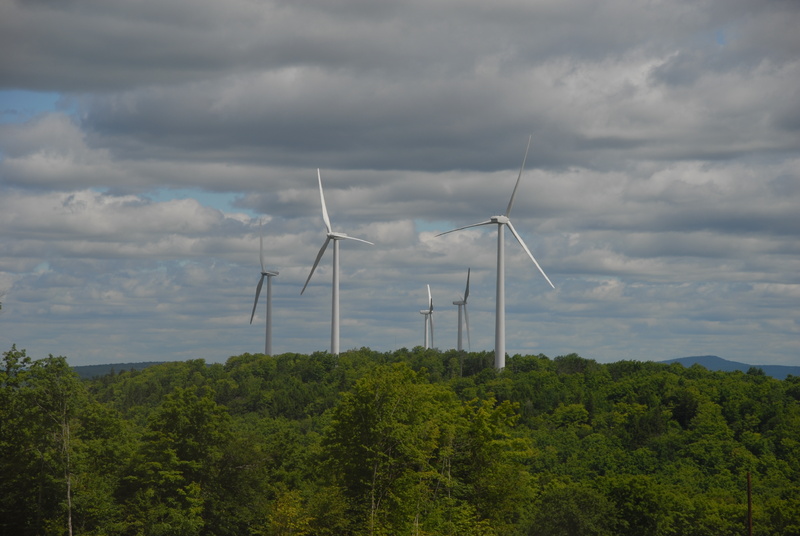PORTLAND — The process by which large wind-power projects get approved, and the noise standards used, dominated discussion Tuesday as the Maine Supreme Judicial Court heard arguments over two proposed wind farms.
In dispute were permits given by the Maine Board of Environmental Protection for the Record Hill Wind project in Roxbury and the Oakfield Wind project in Aroostook County. In both instances, opponents argued that the board failed to allow for public hearings that would have provided a forum to debate connections between health and turbine noise. Because the issues were similar, the court combined the presentations.
Wind power opponents say Maine’s noise regulations are geared toward volume and not the subtle, low-frequency sounds and vibrations emitted by turbines.
Tuesday’s hearing was the latest challenge before Maine’s highest court to the rules for permitting commercial wind energy.
Last spring, the court dismissed a first-of-its-kind appeal of the Rollins Wind project by the Friends of Lincoln Lakes. That challenge also was aimed at the procedures of the state’s 10-member environmental board, as well as a recent law that streamlined the permitting process for wind projects in designated areas.
Rollins is being developed by Boston-based First Wind Holdings, the state’s dominant wind-energy developer. It is under construction near Lincoln, despite protests at the site in the fall.
Tuesday’s court case reflects an escalating battle over wind energy.
Opponents say the benefits are offset by problems that include health effects, aesthetics and the environmental impact of erecting hundreds of towers on Maine’s remote ridgelines. They are stepping up efforts to fight the projects in court, in the Legislature and through the media.
Supporters point to a growing industry that already has created hundreds of construction jobs and $750 million in investment, while providing clean energy for the region. Opponents speak for only a vocal minority, the advocates say, pointing to surveys that suggest widespread public acceptance of wind power.
Record Hill would have 22 turbines and a capacity of 50 megawatts. Developers say it would generate enough electricity annually to meet the needs of every home in Oxford County.
Record Hill is being developed by Brunswick-based Independence Wind, led by former Gov. Angus King and Rob Gardiner, a past president of the Maine Public Broadcasting Network. The project received state environmental permits in August 2009, and road clearing began that fall.
A group called Concerned Citizens to Save Roxbury Pond appealed the permit to the board in March, but the request was denied. That rejection led to the Supreme Court appeal, which, according to the developers, has tied up financing and put the $120 million project on hold.
The court decided to incorporate an appeal of the permit for the 34-turbine project in Oakfield, proposed by First Wind.
Representing the opponents in both cases, Rufus Brown, a Portland attorney, said residents deserve public hearings that more fully examine noise issues and health risks. “Every single project in Maine that has been built near homes has generated serious complaints,” he said.
Chief Justice Leigh Saufley noted that plenty of evidence is submitted in permit reviews, and asked what the hearings would achieve. Specifically, Brown said, he wanted to be able to cross-examine state experts about the effects of turbine noise.
Assistant Attorney General Gerald Reid noted that the hearings Brown sought were discretionary by law. That led Justice Donald Alexander to question why the board wouldn’t want a fuller examination of the persistent health concerns.
Reid replied that Maine’s former health director has found no health effects linked to turbines, and that the noise limits proposed by developers were reviewed by a consultant.
But Saufley and Justice Ellen Gorman noted that low-frequency noise is a major area of disagreement. And Saufley wanted to know what remedies will be available to neighbors if medical experts confirm health effects in the future.
The developer’s operating license could be modified or revoked, said Margaret Bensinger, an assistant attorney general.
Saufley asked whether that has ever happened to a wind project.
No, Bensinger said.
The justices had a similar line of questioning for Juliet Browne, a Portland lawyer representing First Wind and Record Hill.
At Record Hill, her client held a total of 27 meetings with residents and local officials, Browne said. She also indicated that the turbines at Record Hill and Oakfield would be far from homes, in contrast to project sites where nearby turbines have disturbed neighbors.
Some of the justices’ comments appeared sympathetic to the petitioners, but the challenges hinge on specific legal points tied to the state permit.
It’s not clear when the court will rule.
Staff Writer Tux Turkel can be contacted at 791-6462 or at: tturkel@pressherald.com
Send questions/comments to the editors.




Comments are no longer available on this story